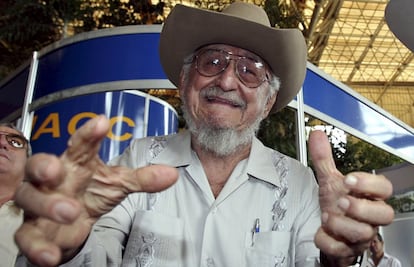Ramón Castro, Fidel’s rancher brother, dies at 91
Cuban leaders’ elder sibling did not play a major role in the Revolution

People would often confuse him because of his uncanny resemblance to his brother, the leader of the Revolution.
But Ramón Castro – known better as “Mongo” – was older than Fidel and his other sibling, current Cuban President Raúl Castro.
Ramón, who died Tuesday at age 91, was the rural worker in the family. He operated his parents’ farm and was tied to the agricultural sector, holding ministry advisory posts and supervising various farming and livestock companies.
Mongo Castro was chatty and friendly and would often wear a cowboy hat.
In 1953, Mongo Castro was jailed briefly after his brothers led the attack on the Moncada army barracks
Unlike Fidel and Raúl, he did not play a major role in the Revolution and held no important posts in government following Fulgencio Batista’s overthrow in 1959.
He was jailed in 1953, and during the armed conflict in the Sierra Maestra helped transport weapons and food supplies to the revolutionaries hiding in the mountains.
Born on October 14, 1924 in the small eastern village of Birán, Holguin province, Ramón Castro was the second of seven children born to Galician migrant Ángel Castro and Cuban Lina Ruz.
Ángela, who died in 2012, was the eldest and then, after Mongo, came Fidel, Juanita, Emma, Raúl and Agustina.
In a book published some years back, Fidel recalled how he and his brother had been close since they were boys.
“Ramón was always with me and we were always getting into some type of adventure as if we were both twins. We were more or less the same age, although he was a little older than I was. We would pull pranks at school, always together in the good and the bad,” he wrote.
The family sent the three boys to study at Catholic schools in Santiago de Cuba. But while Fidel and Raúl took off for Havana to continue their studies and become involved in anti-Batista activities, Mongo returned to Birán to help his father run the family farm.
They eventually came to cultivate around 1,000 hectares of sugar cane, which they supplied to US companies.
“Ramón was always with me and we were always getting into some type of adventure. We would pull pranks at school, always together in the good and the bad”
Following the attack on the Moncada army barracks by Fidel in 1953, Mongo was arrested but was never implicated directly in the uprising.
“Ramón helped out somewhat in the Moncada attack – but not in the fight for socialism. He didn’t know what we were planning but I let him know that we were involved in anti-Batista activities. He was against Batista,” wrote Fidel in his memoir Guerrillero del tiempo (Guerrilla of Time).
Mongo stayed in Birán with his parents but never lost contact with his brothers when they were in prison. After they returned from exile in Mexico, Mongo organized deliveries of food and supplies to the Frank País Second Front, the guerrilla unit led by Raúl Castro in the Sierra Cristal mountain range.
Following Fidel’s rise to power, Mongo held no special posts in his government but did work with the agricultural sector and was a consultant at different ministries.
At the beginning of this century, when important US businessmen and state governors began visiting Cuba, Mongo befriended rancher John Parke Wright of J.P. Wright & Co. of Florida, who became the first US rancher to sell livestock to Havana.
When Fidel Castro fell ill in 2006 and rumors were spreading that his death was imminent, Mongo Castro joked with EL PAÍS at a diplomatic reception.
“Our father died at 82 from hernia complications. The Galicians are very tough people, so the Castros will be around for a long time.”
English version by Martin Delfín.
Tu suscripción se está usando en otro dispositivo
¿Quieres añadir otro usuario a tu suscripción?
Si continúas leyendo en este dispositivo, no se podrá leer en el otro.
FlechaTu suscripción se está usando en otro dispositivo y solo puedes acceder a EL PAÍS desde un dispositivo a la vez.
Si quieres compartir tu cuenta, cambia tu suscripción a la modalidad Premium, así podrás añadir otro usuario. Cada uno accederá con su propia cuenta de email, lo que os permitirá personalizar vuestra experiencia en EL PAÍS.
¿Tienes una suscripción de empresa? Accede aquí para contratar más cuentas.
En el caso de no saber quién está usando tu cuenta, te recomendamos cambiar tu contraseña aquí.
Si decides continuar compartiendo tu cuenta, este mensaje se mostrará en tu dispositivo y en el de la otra persona que está usando tu cuenta de forma indefinida, afectando a tu experiencia de lectura. Puedes consultar aquí los términos y condiciones de la suscripción digital.








































